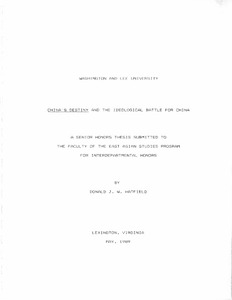| dc.rights.license | In Copyright | en_US |
| dc.creator | Hatfield, Donald J. W. | |
| dc.date.accessioned | 2023-10-20T18:02:02Z | |
| dc.date.available | 2023-10-20T18:02:02Z | |
| dc.date.created | 1989 | |
| dc.identifier | WLURG038_Hatfield_thesis_1989 | |
| dc.identifier.uri | https://dspace.wlu.edu/handle/11021/36566 | |
| dc.description.abstract | In late 1942, as China was threatened by Japanese encroachment and beset by internal economic and political problems, Chiang Kai-shek, director- general (Tsung- ts'ai) of the Kuomintang (hereafter KMT), busily compiled his maqnum opus, China's Destiny. Published on 10 March 1943, to mark the anniversary of Sun Yat-sen's death, this book soon became known to KMT ideologues as the "best textbook for political education," after Dr. Sun's Three Principles of the People. [1] Its detractors simply labeled it the "Chinese Mein Kampf." China's Destiny is indeed a somewhat dull long-winded version of modern Chinese history with overtones of nostalgia for the era in which Confucian ethics were still intact. To a modern reader, it does not seem shocking in the least. How is it that such a book became so controversial? One answer can be found in the epigraph by Philip Jaffe. If China's Destiny were just an academic exercise it soon would have been neglected on the shelves of libraries and bookstores. It was more than just a scholarly work, however; China ' s Destiny was an attempt to influence the thought of China's citizens, especially the youth. [2] China's students had long opposed government policies from the May Fourth Movement in 1919 to demands for a united front and constitutional government in the 1940s. KMT leaders instituted many programs, such as the San Min Chu Yi Youth Corps, to persuade students to adhere to "orthodox"
party doctrines. China's Destiny played an important role in this indoctrination program, as a political bible to be digested and absorbed. Students, army officers, civil servants and members of the Youth Corps all were required to read and pass examinations on the book. [3] [From introductory section] | en_US |
| dc.format.extent | 86 pages | en_US |
| dc.language.iso | en_US | en_US |
| dc.rights | This material is made available for use in research, teaching, and private study, pursuant to U.S. Copyright law. The user assumes full responsibility for any use of the materials, including but not limited to, infringement of copyright and publication rights of reproduced materials. Any materials used should be fully credited with the source. | en_US |
| dc.rights.uri | http://rightsstatements.org/vocab/InC/1.0/ | en_US |
| dc.subject.other | Washington and Lee University -- Honors in East Asian Studies | en_US |
| dc.title | China's Destiny and the Ideological Battle for China | en_US |
| dc.type | Text | en_US |
| dcterms.isPartOf | WLURG038 - Student Papers | en_US |
| dc.rights.holder | Hatfield, Donald J. W. | en_US |
| dc.subject.fast | Chiang, Kai-shek, 1887-1975 | en_US |
| dc.subject.fast | Zhongguo zhi ming yun (Chiang, Kai-shek) | en_US |
| dc.subject.fast | China | en_US |
| dc.subject.fast | Politics and government | en_US |
| dc.subject.fast | Education -- Political aspects | en_US |
| local.department | East Asian Studies | en_US |
